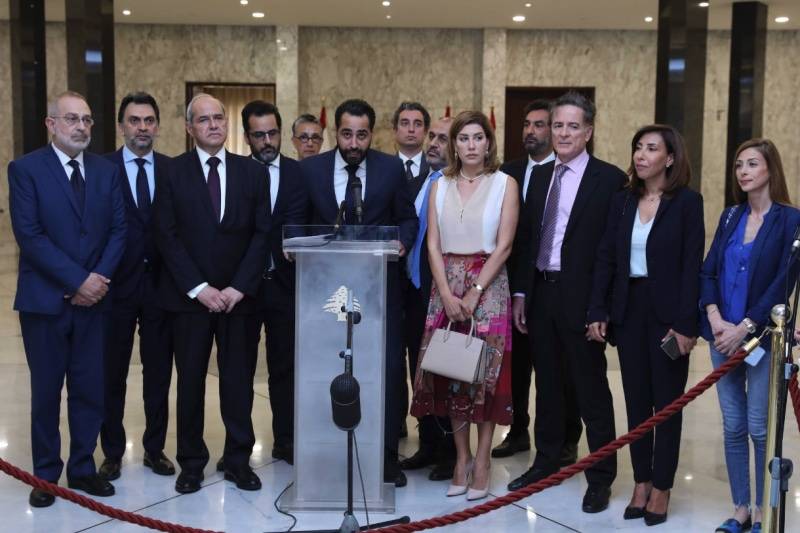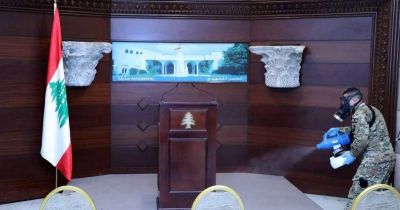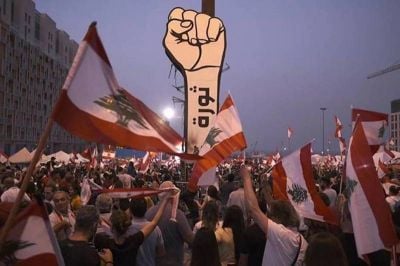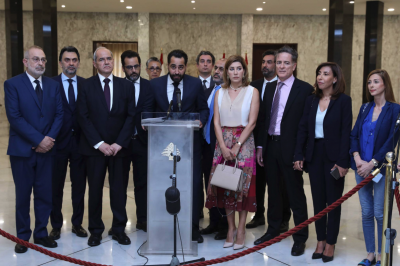
The 13 Forces of Change MPs at Baabda Palace on June 23, 2022. (Credit: Dalati and Nohra)
Zgharta MP Michel Douaihy has broken away from the parliamentary bloc of the 13 MPs representing the protest movement — a development that highlights the growing differences among the Forces of Change elected representatives.
Many pundits fear that these disagreements might cause the group of 13 to disperse, just a few days after the third anniversary of the Oct. 17, 2019, popular uprising.
This prospect risks further undermining the Forces of Change MPs’ position ahead of a major constitutional deadline: the election of the country’s 14th president since Lebanon’s independence, as current President Michel Aoun’s term ends on Oct. 31.
“I am now completely outside the bloc of the 13 [Forces of] Change MPs in its current form,” Douaihy announced via Twitter on Oct. 18 after a parliamentary session during which members of parliamentary committees were elected and voting took place on several laws.
The session was perceived as a major blow to the protest movement MPs who failed to re-elect their colleague Ibrahim Mneimneh (Beirut II) to the Finance and Budget Committee, a crucial body for the country facing an unprecedented social and political crisis.
In fact, Mark Daou (Forces of Change/Chouf) ended up running last-minute alongside Mneimneh, which caused them both to lose to Adnan Traboulsi (Ahbash, pro-Syrian).
This setback is all the more stinging since an agreement had previously been reached with Parliament Speaker Nabih Berri to ensure that the protest movement MPs — who make up 10 percent of Parliament — are represented in all committees. But the Forces of Change MPs were swift to change their mind and demanded that proper elections be held to elect the parliamentary committee members.
Mneimneh and Daou exchanged a few views on social media, with Daou trying to justify his candidacy by the agreement with Berri — a version of events that Mneimneh denied.
"Mark's decision has surprised many within the bloc and no one was happy with it," Yassin Yassin (Forces of Change/West Bekaa) told L'Orient-Le Jour.
Meanwhile, Daou refused to comment.
Earlier, a controversy also broke out between Mneimneh and his colleague Waddah Sadek.
While Mneimneh had been invited to a Swiss Embassy dinner scheduled for Tuesday that was later — following reported opposition from Saudi Arabia — postponed indefinitely, in what seemed to be an indication of willingness from Bern to start a new inter-Lebanese dialogue, Sadek strongly criticized any attempt to revise the Taif Agreement that ended Lebanon’s 1975-90 Civil War. The agreement was signed in Taif, Saudi Arabia.
“Some of our colleagues’ positions vis-a-vis the Taif Agreement and their rejection of development of a decision-making mechanism ... threaten our group,” Mneinmeh said Oct. 16.
'Vetocracy'
These developments revealed how difficult it is for the heterogeneous Forces of Change MPs to maintain unity and to put in place a decision-making mechanism, prompting Douaihy to withdraw from the bloc.
“I am in favor of turning the bloc into a monthly consultative gathering … with a full margin of freedom for all MPs on all issues,” he said in his Oct. 18 tweet.
According to an opposition MP who spoke to L'Orient-Le Jour on condition of anonymity, several disagreements, including on key issues such as the presidential election, exist among the protest movement MPs.
“These 13 MPs act like a vetocracy. They only take decisions by unanimity. They are just mimicking everything that is wrong with our political system rather than fighting it,” the opposition MP said.
For instance, early on in the electoral campaign before the May 15 legislative polls, Daou and Sadek said they would support Michel Moawad (Independent/Zgharta) for president.
But during the first parliamentary session to elect a new president, neither MPs voted for Moawad, yielding to the wishes of their own parliamentary bloc.
The Forces of Change MPs had actually put forth a presidential initiative centered around several candidates “beyond the traditional political divide.” such as former minister Ziyad Baroud or former MP Salah Honein.
March 14 remodeled?
The protest movement MPs also failed to reach an agreement during the binding parliamentary consultations for the appointment of a prime minister in June.
Only 10 of the 13 MPs managed to agree on and support the nomination of Nawaf Salam, former Lebanese ambassador to the UN and judge at the International Court of Justice.
MPs Halime Kaakour (Chouf), Elias Jarade (Marjayoun) and Cynthia Zarazir (Beirut I) were opposed to Salam’s candidacy, claiming that he is reputedly close to former Prime Minister Fouad Siniora, a figure from the traditional political division.
“There is a desire, mainly on the part of Western and Arab embassies, to transform the protest movement bloc into a remodeled March 14, which reduces the country’s problem vis-a-vis the issue of Hezbollah without going further into reforms,” one MP’s adviser told L’Orient-Le Jour on condition of anonymity.
“Within the bloc of 13, there is a minority of MPs who refuse to align themselves with the traditional parties simply because they say they are opposed to Hezbollah, and this is the main point of contention within the group,” the adviser said. “If this continues, this political phenomenon risks imploding from within.”
Meanwhile, Yassin appears to be less pessimistic.
“Of course, there are disagreements, but there are also many common points on which we can capitalize,” Yassin told L’Orient-Le Jour.
“I think we will be able to stay united and I also hope that Michel Douaihy will stay with us, at least by attending the meetings," he added.
According to several sources, a meeting was held on Oct. 19 between the protest movement MPs’ bloc to prepare the next step, especially before the parliamentary session for the presidential election slated for Thursday, during which no president was elected
Another session is scheduled for Oct. 24.
This article was originally published in French in L'Orient-Le Jour. Translations by Sahar Ghoussoub.



